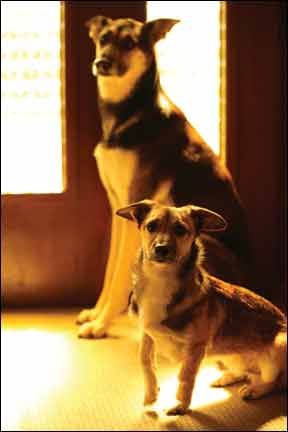As much as we worry if we’re doing the best for our dogs, any veterinarian can tell you that many of the problems they see are accidents, predictable and completely preventable., Around any holiday, that’s even more true, when people get busy, routines get changed and visitors come to call. All the changes put both people and dogs at higher risk of accident or illness.
That’s the bad news. The good news is that five simple steps will keep most pets from being hurt – and potentially hurting others.
1. Don’t knock Grandma down.
One of my dogs, an agile and athletic young retriever, used to body-slam me for fun. She’d run up alongside me as I walked out to feed the horses, launch herself vertically, slam her body against mine in mid-air then race away with her tongue. lolling and a big grin on her face. Her greetings for guests were a little more restrained, but not much.
My mother is almost 80 years old and walks with a cane. Bouncy big dog, unsteady senior citizen: Now that’s a bad combination. I changed the pasture game to “fetch the flymasks,” giving my high-energy dog a job that fits her natural instincts (retrieving) and her natural drive (powerful). Inside, the alternative to her ill-mannered greetings became fetching a toy, sitting, and waiting to present it. Other dogs might do well when taught to “place” on a mat away from the door when guests arrive.
2. Watch for potential poisoning.
The biggest problem at this time of year may be guests who assume pets will leave pill bottles alone, and set their medications on nightstands in their rooms. Common drugs, including those for humans and animals, prescription and over-the-counter, poison thousands of pets every year. Remind your guests to keep medications in drawers or behind pet-proof cabinet doors. Make sure purses and backpacks are out of reach, too; those medications and Xylitol-sweetened candies, mints, and gums tucked into carry-ons and other luggage can tempt even a well-mannered pet.
Other poisons to look out for are mistletoe and holly (poinsettia’s lethal reputation is an urban myth). Plain old garbage can mean a trip to the ER if your pet gets into it, too. Put leftover-rich garbage up or take it out.
3. Be ready for escapes.
Your dog should wear an ID tag with your current home and/or cell number on it – and a microchip that’s registered, with current information. Yes, you can (and should) train your dog to wait at the door for your permission to go through it; that has prevented many a dog from being hit by a car. For now, though, crates and gates are your dog’s best friends when company comes calling. If your dog slips out despite your best intentions, don’t run after him. Run the other way to get him to chase you, then kneel and open your arms wide and encourage him to come to you. If you can get him close but not quite close enough to catch, don’t order him to “come” – especially if you’re pretty sure he won’t. Instead, say “sit.” Most dogs know “sit” far better and will be more likely to comply. Then make “train my dog” one of your New Year’s Resolutions.
4. Anticipate and prevent resource-guarding.
If your dog is anxious around his dish, it’s not a bad idea to pick a more quiet, less-traveled place to feed him than the kitchen while company is in the house. Pick up and put away toys as well. And while you can ask the two-legged guests to give your dog respect and space, things are a little trickier with canine company. If you have any doubts whatsoever about your dog’s ability to handle other animals in his own home, don’t allow guests to bring their dogs along. Speak up for your dog!
5. Know where to get help.
All-night emergency veterinary practices are common in big cities, but rare in small towns – unless yours is a college town with a veterinary school. In lieu of an emergency care practice, your veterinarian may share on-call duties, or handle them herself; be sure to ask now. When traveling, bookmark a veterinary-locator site on your laptop, or buy an app for your smartphone that will find the nearest 24/7 veterinarian. Better to know and not need the information than to need the information and not have it. But the fact is you probably won’t need an ER if you make sure to reduce the risk of danger to pets and people. A few simple precautions will make sure your holidays stay happy.
A resident of Northern California, Gina Spadafori is a syndicated pet-care columnist and the author of more than dozen books on animals and their care.





